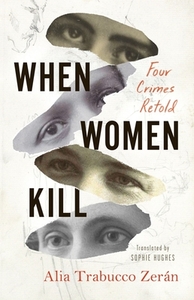You need to sign in or sign up before continuing.
Take a photo of a barcode or cover
challenging
dark
informative
medium-paced
challenging
informative
inspiring
mysterious
reflective
medium-paced
Disfruté la lectura de este libro. Al autora nos presenta un ensayo que trabaja con las representaciones discursivas de la mujer criminal, lo que logra generar un debate sobre los roles femeninos mucho más allá de lo estrictamente criminal. Me parece que sus reflexiones provienen de una investigación intensa y dedicada. Me gustó mucho que utilizara, en su mayoría, autoras mujeres para su marco conceptual. Logra conectar estos hechos del pasado con nuestro presente, introduciendo temas como el aborto, el trabajo doméstico, los roles de género, entre otros.
Pretty good. Did not sensationalize any aspect of their crimes and offered a feminist lens to the convo
dark
informative
reflective
medium-paced
medium-paced
informative
medium-paced
Graphic: Murder
Minor: Infidelity, Abortion
fast-paced
“When Women Kill” is a non-fictional account of four infamous women killers in Chile in the course of the 20th century by Alia Trabucco Zerán (tr: Sophie Hughes). In this “retelling” of the women’s crimes, Zerán focused on delving into all the evidence from newspapers, court documents, and other sources to draw an untold before narrative. Trained as a lawyer, the author has combed through countless documents in order to read between the lines of the underlying assumptions which seemed to influence the judgement of the criminal cases in this book.
In this, readers will read about a woman murdering her husband for love, a wife murdering her husband for vengeance, a writer who killed her lover in full view of other patrons in a restaurant they were dining at and remained silent as to why she killed him, and a domestic worker who sought her own brand of justice by murdering her employers’ children. In all these cases, there are common threads amongst them: the denial that women are also capable of cold-blooded murder due to their assumed fragile nature, the assumption that the murders are always motivated by jealousy and women’s ‘hysteria’, and the fact that the women’s cases were always treated as a cautionary tale to the dangers of feminism, socialism, and class politics.
While Zerán made a compelling argument through her narrative, be warned that most of them are still conjectures cobbled through documents and the author’s own assumptions (and perhaps bias). We will never know what truly drove some of these women to murder, especially when the women’s testimonies and characters were always twisted to suit society & the mass media’s narrative at the time. All in all, I would highly recommend this read for all my true crime girlies and those who are interested in such subjects, with the caveat that you should always take everything you read with a grain of salt. (Not literally lah, but can also if you’d like, lol.)
Thank you to @translatedgems for rec’ing this book for the #TGReadingChallenge2023, this was truly an engrossing read!
In this, readers will read about a woman murdering her husband for love, a wife murdering her husband for vengeance, a writer who killed her lover in full view of other patrons in a restaurant they were dining at and remained silent as to why she killed him, and a domestic worker who sought her own brand of justice by murdering her employers’ children. In all these cases, there are common threads amongst them: the denial that women are also capable of cold-blooded murder due to their assumed fragile nature, the assumption that the murders are always motivated by jealousy and women’s ‘hysteria’, and the fact that the women’s cases were always treated as a cautionary tale to the dangers of feminism, socialism, and class politics.
While Zerán made a compelling argument through her narrative, be warned that most of them are still conjectures cobbled through documents and the author’s own assumptions (and perhaps bias). We will never know what truly drove some of these women to murder, especially when the women’s testimonies and characters were always twisted to suit society & the mass media’s narrative at the time. All in all, I would highly recommend this read for all my true crime girlies and those who are interested in such subjects, with the caveat that you should always take everything you read with a grain of salt. (Not literally lah, but can also if you’d like, lol.)
Thank you to @translatedgems for rec’ing this book for the #TGReadingChallenge2023, this was truly an engrossing read!
dark
informative
reflective
fast-paced




